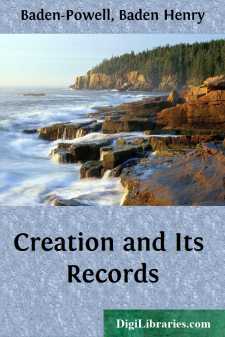Categories
- Antiques & Collectibles 13
- Architecture 36
- Art 48
- Bibles 22
- Biography & Autobiography 813
- Body, Mind & Spirit 142
- Business & Economics 28
- Children's Books 17
- Children's Fiction 14
- Computers 4
- Cooking 94
- Crafts & Hobbies 4
- Drama 346
- Education 46
- Family & Relationships 57
- Fiction 11829
- Games 19
- Gardening 17
- Health & Fitness 34
- History 1377
- House & Home 1
- Humor 147
- Juvenile Fiction 1873
- Juvenile Nonfiction 202
- Language Arts & Disciplines 88
- Law 16
- Literary Collections 686
- Literary Criticism 179
- Mathematics 13
- Medical 41
- Music 40
- Nature 179
- Non-Classifiable 1768
- Performing Arts 7
- Periodicals 1453
- Philosophy 64
- Photography 2
- Poetry 896
- Political Science 203
- Psychology 42
- Reference 154
- Religion 513
- Science 126
- Self-Help 84
- Social Science 81
- Sports & Recreation 34
- Study Aids 3
- Technology & Engineering 59
- Transportation 23
- Travel 463
- True Crime 29
Creation and Its Records
Description:
Excerpt
CHAPTER I.
INTRODUCTORY
Among the recollections that are lifelong, I have one as vivid as ever after more than twenty-five years have elapsed; it is of an evening lecture—the first of a series—given at South Kensington to working men. The lecturer was Professor Huxley; his subject, the Common Lobster. All the apparatus used was a good-sized specimen of the creature itself, a penknife, and a black-board and chalk. With such materials the professor gave us not only an exposition, matchless in its lucidity, of the structure of the crustacea, but such an insight into the purposes and methods of biological study as few could in those days have anticipated. For there were as yet no Science Primers, no International Series; and the "new biology" came upon us like the revelation of another world. I think that lecture gave me, what I might otherwise never have got (and what some people never get), a profound conviction of the reality and meaning of facts in nature. That impression I have brought to the attempt which this little book embodies. The facts of nature are God's revelation, of the same weight, though not the same in kind, as His written Word.
At the same time, the further conviction is strong in my mind, not merely of the obvious truth that the Facts and the Writing (if both genuine) cannot really differ, but further, that there must be, after all, a true way of explaining the Writing, if only it is looked for carefully—a way that will surmount not only the difficulty of the subject, but also the impatience with which some will regard the attempt. Like so many other questions connected with religion, the question of reconciliation produces its double effect. People will ridicule attempts to solve it, but all the same they will return again and again to the task of its actual solution.
That the latter part of the proposition is true, has recently received illustration in the fact that a review like the Nineteenth Century, which has so little space to spare, has found room in four successive numbers for articles by Gladstone, Huxley, and H. Drummond, on the subject of "Creation and its Records." May I make one remark on this interesting science tournament? I can understand the scientific conclusions Professor Huxley has given us. I can also understand Mr. Gladstone, because he values the Writing as the professor values the Facts. But one thing I can not understand. Why is Professor Huxley so angry or so contemptuous with people who value the Bible, whole and as it stands, and want to see its accuracy vindicated? Why are they fanatics, Sisyphus-labourers, and what not? That they are a very large group numerically, and hardly contemptible intellectually, is, I think, obvious; that a further large group (who would not identify themselves wholly with the out-and-out Bible defenders) feel a certain amount of sympathy, is proved by the interest taken in the controversy. Yet all "reconcilers" are ridiculed or denounced—at any rate are contemptuously dismissed....


